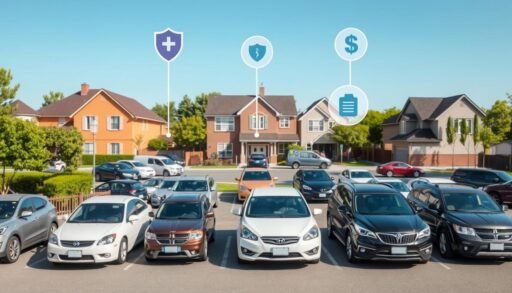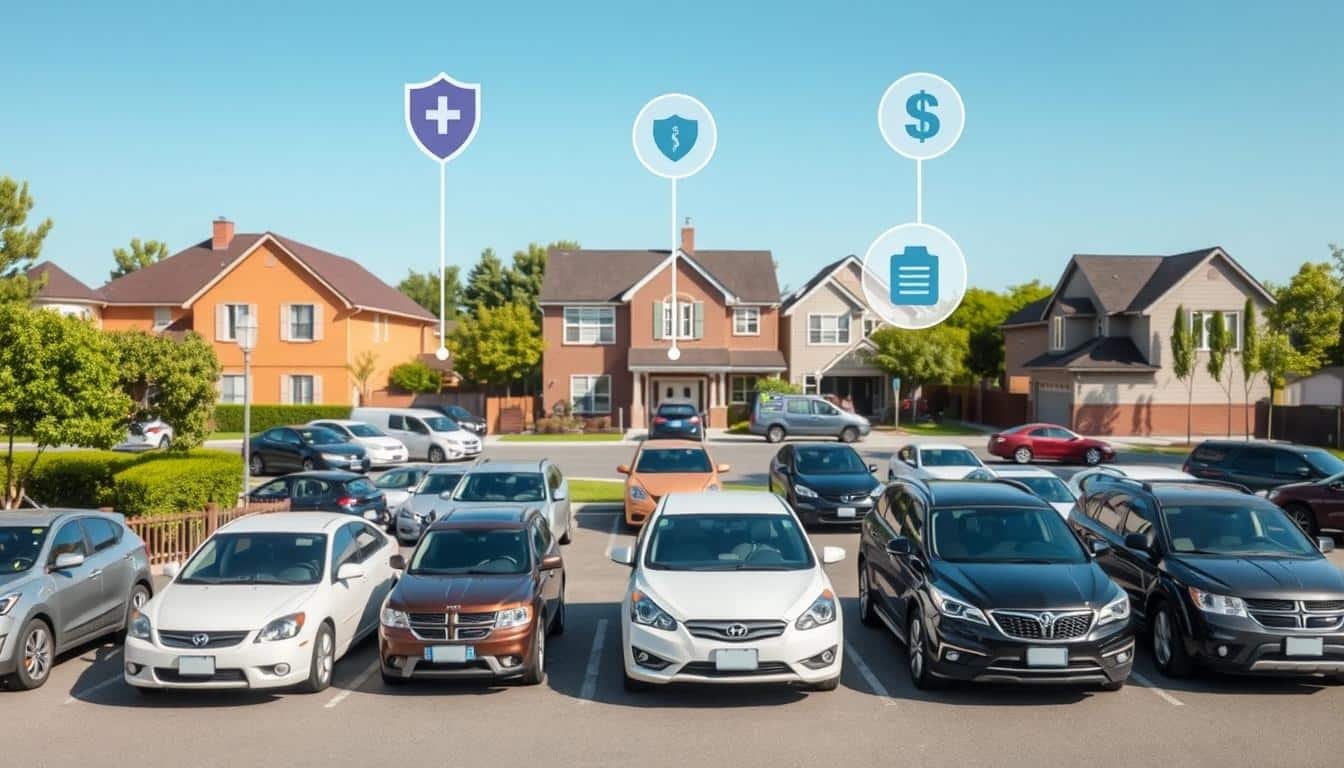Car insurance is a key protection for your money in case of car accidents, theft, or other unexpected events. It can help pay for car repairs, medical bills, and damages you might cause to others. Basic car insurance is needed in almost every state to keep you safe financially if you’re in an accident.
Auto insurance also offers liability coverage to protect you if you’re at fault for someone else’s injuries or damages. You can also get extra coverages like collision, comprehensive, and uninsured/underinsured motorist coverage. These car insurance coverage options can save you from big expenses and give you peace of mind while driving.
Key Takeaways
- Car insurance is a financial safeguard in case of accidents, theft, or other auto incidents
- Basic car insurance covers liability to protect you if you cause injuries or damages to others
- Optional coverages like collision, comprehensive, and uninsured/underinsured motorist protection can shield your own vehicle
- Car insurance is required in almost every state to drive legally
- Having the right car insurance coverage can provide peace of mind and financial protection
Understanding Car Insurance Requirements
Car insurance can seem overwhelming, but knowing the basics is key. Almost every state, including New York, has rules for car insurance. These rules are important for all drivers to follow to legally drive on the roads.
Mandatory Coverages
The main coverages you need include:
- Bodily Injury Liability to cover injuries and death while driving.
- Property Damage Liability to pay for damage to others’ vehicles or property.
- Medical Payments or Personal Injury Protection for medical costs for you and your passengers.
- Uninsured Motorist Coverage to protect you if hit by an uninsured driver.
- Underinsured Motorist Coverage for extra protection if the other driver’s insurance is not enough.
In New York, the state requires a minimum of:
- Bodily Injury Liability: $25,000 per person/$50,000 per accident
- Property Damage Liability: $10,000 per accident
- Personal Injury Protection (PIP): $50,000 per person
- Uninsured/Underinsured Motorist Bodily Injury: $25,000 per person/$50,000 per accident
These minimums offer some protection, but you might need more to fully protect yourself and your assets in a big accident.
“Carrying the state-required minimum auto insurance coverage is a good starting point, but it may not be enough to fully protect you in the event of a serious accident. Consider increasing your liability limits and adding optional coverages for greater peace of mind on the road.”
Knowing the mandatory coverages and state rules helps you stay legal and protect your finances.
Optional Car Insurance Coverages

Basic liability coverage is a must, but there are more options to protect you financially. Collision coverage helps pay for damage to your car in accidents. Comprehensive coverage covers theft, vandalism, and natural disasters. Glass coverage covers windshield repairs, and gap insurance pays the difference if your car is totaled. You can adjust your coverage to fit your needs and budget.
About 80 percent of U.S. drivers have collision and comprehensive coverage, says the Insurance Information Institute (III). This shows many people see these options as valuable.
| Coverage Type | What It Covers | Key Considerations |
|---|---|---|
| Collision Coverage | Damage to your vehicle from a collision with another car or object | Higher deductibles can lower your premiums, but you’ll pay more out-of-pocket if you file a claim. |
| Comprehensive Coverage | Damage to your vehicle from non-collision events like theft, vandalism, or natural disasters | Comprehensive coverage is often required if you have a loan or lease on your vehicle. |
| Glass Coverage | Repair or replacement of your windshield and other glass | This coverage can help you avoid the cost of expensive windshield replacements. |
| Gap Insurance | The difference between what you owe on a leased or financed vehicle and its actual cash value if it’s totaled | Gap insurance is often recommended for new car purchases or leases to protect against depreciation. |
Knowing about optional coverage options helps you choose the right coverage amounts for your driving and budget.
Car Insurance Coverage And Why It Matters

Peace of Mind
Car insurance is key because it protects your finances in case of an accident. Without it, fixing your car, medical bills, and damages to others can be too much to handle. State laws require a minimum, but more coverage and options like uninsured/underinsured motorist can offer more security.
In California, the minimum liability coverage is $15,000 for one person, $30,000 for multiple, and $5,000 for property damage. But, these might not cover all costs of a big accident. Raising your coverage and adding extra options can prepare you for the unexpected.
Car insurance also helps with medical costs from accidents. This way, you don’t face huge bills and can get the care you need without financial stress.
Car insurance is vital for financial safety and peace of mind. It shields you from the bad effects of accidents. By getting full coverage, you protect yourself, your car, and others, making the roads safer and more stable.
Car Insurance Coverage

When it comes to car insurance coverage, you have many coverage options to choose from. These options help meet your specific needs and budget. You can get liability coverage, which is mandatory in most states. You can also get collision and comprehensive coverages to protect your vehicle.
The coverage amounts you choose affect your insurance premiums. Think about your car’s value, your deductible, and how much financial protection you need. Your car insurance policy can be tailored to fit your needs and budget.
For example, Progressive offers a variety of coverage options. These include:
- Loan/lease payoff coverage, which can cover up to 25% of a vehicle’s actual cash value if it’s stolen or totaled for financed or leased cars.
- Rental car reimbursement for a covered accident up to policy limits.
- Roadside Assistance for towing, lock-out service, flat tire changes, and more.
- Trip interruption coverage to help with related costs if your car breaks down more than 100 miles from home.
- Vehicle Protection for major systems, minor dents, and lost keys on newer cars.
- Custom parts and equipment (CPE) coverage up to $5,000 for items like stereo systems or custom wheels.
- Rideshare coverage for protection while driving for rideshare services.
- Pet injury coverage for up to $1,000 in veterinary bills if a pet is injured in an accident in your car.
The car insurance coverage you choose should match your needs and budget. By understanding the different coverage options, you can make a smart choice. This ensures you have the right coverage amounts for your situation.
Also Read : What Is Commercial Auto Insurance And Why Do Businesses Need It?
Conclusion
Car insurance is a must-have for financial safety in case of accidents, theft, or other car issues. State laws require a minimum of liability coverage. But, there are many optional coverages to protect your vehicle and assets more.
By knowing the different car insurance coverage types, you can tailor your policy. This way, you’re ready for anything unexpected on the road.
The importance of car insurance is huge. It meets mandatory requirements and gives you a vital financial protection. It helps cover the costs of accidents, damages, and liabilities.
Whether you need basic liability or more, you can adjust your car insurance coverage. This ensures you’re well-protected for your driving needs and situations.
Car insurance is a key investment in your safety and finances. By choosing the right options and customizing your coverage, you can drive confidently. You’ll know you’re prepared for whatever the road brings.
FAQs
Q: What are the different types of car insurance coverage?
A: The types of car insurance coverage include liability coverage, collision coverage, comprehensive coverage, personal injury protection, medical payments coverage, and uninsured/underinsured motorist coverage.
Q: Why is auto insurance important?
A: Auto insurance is essential because it provides financial protection in case of a car accident. It covers damages to your vehicle, medical expenses, and liability for injuries or damages you may cause to others.
Q: How does liability coverage work?
A: Liability coverage pays for bodily injury and property damage to others if you are at fault in a car accident. It helps protect your assets in case of a lawsuit stemming from an accident.
Q: What is the difference between comprehensive and collision coverage?
A: Comprehensive coverage helps pay for damages to your car from non-collision incidents like theft, vandalism, or natural disasters, while collision coverage pays for damages resulting from a collision with another vehicle or object.
Q: How much car insurance coverage do I need?
A: The amount of car insurance coverage you need varies by state and personal circumstances. It’s essential to evaluate your assets and consider factors like your driving habits and the value of your vehicle to determine the right coverage.
Q: What is personal injury protection coverage?
A: Personal injury protection coverage (PIP) helps cover medical expenses, lost wages, and other related costs for you and your passengers after a car accident, regardless of who is at fault.
Q: What is gap insurance and when should I consider it?
A: Gap insurance covers the difference between what you owe on your car loan and its actual cash value in case of a total loss. It’s particularly useful for those who have financed a vehicle and owe more than its current market value.
Q: What are the coverage requirements for car insurance?
A: Coverage requirements vary by state, but most require a minimum amount of liability insurance. It’s important to check your state’s specific regulations to ensure compliance and adequate protection.
Q: Can I pay for a rental car with my insurance coverage?
A: Yes, some auto insurance policies offer rental reimbursement coverage, which helps pay for a rental car while your car is being repaired after an accident. Check with your insurer for specific coverage options.
Q: What should I do if I get into a car accident?
A: If you are involved in a car accident, ensure everyone’s safety first, exchange information with the other party, document the scene, and contact your insurance company to report the incident and begin the claims process.

